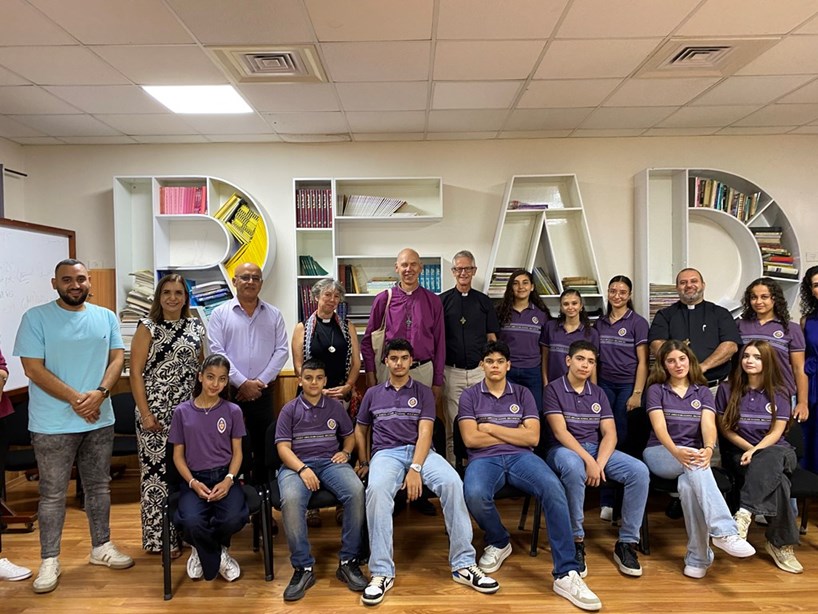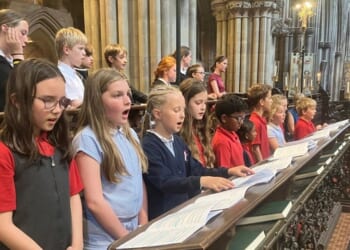I RECALL a conversation with a Palestinian man working in annexed East Jerusalem — the father of two teenage girls — which I will never forget. The man looked me straight in the eye and said: “My life has been ruined by the Israeli occupation. When my children are old enough, I want them to get as far away from the land as they possibly can.” I found it a deeply shocking statement, an incredible thing for a father to say for their children, and I imagined how I would feel if it were me.
I have just returned from a week-long visit to the Holy Land: a pilgrimage of solidarity with the churches in the Anglican diocese of Jerusalem, with which the diocese of Southwark has a covenant agreement.
As the Bishop of Kingston, I am responsible for developing this relationship, and the visit was an opportunity to work with my counterparts to plan next steps. I was travelling with the Revd Helen Burnett, a priest in Southwark diocese, who is a founding member of Christians for Palestine. During our visit, we were kindly hosted by St George’s College and its Dean, the Very Revd Canon Richard Sewell.
ON ARRIVAL, we hit the ground running, attending a service at Emmanuel Church, Ramle, a mixed Arab and Jewish community close to Tel Aviv. The community was very much in the firing line when Israel and Iran traded missiles in June. As is customary, I was invited to preach — not an easy thing when you have just flown in from south-west London!
The words from Deuteronomy set for the 12th Sunday after Trinity — “Choose life so that your descendants may live” (Deuteronomy 30.19) — grated as I thought about the horrendous war in Gaza and Israel’s ongoing occupation of Palestine, which seems designed to suck the life out of even the most ebullient or cheerful. Life is a beautiful thing — a gift from God for all people. And yet how does one choose life in such desperate circumstances?
As I prepared to preach, I reflected on my own complicity in the events of recent years — times when I have not spoken out, have looked the other way, been distracted by other things, and not shown sufficient compassion. All the time during the visit, we were reminded about the failures of Western governments, and, indeed, the failures of the Church. “The British people are good,” they said, “their government, bad.”
Shortly after we arrived in Israel and the occupied Palestinian territories, we heard news of a shooting at Ramot junction in annexed East Jerusalem, not far from where we were staying; six people were killed and 21 were injured.
While we were not directly affected, it caused chaos for commuters and prompted immediate punitive raids by the Israeli Defense Forces (IDF) on Palestinian villages thought to be linked to the attackers. Many people told us how the consequences for the relatives of the attackers would be uncompromising and severe, including demolition of their homes and the termination of any right to travel outside the Occupied Territories. A day later, Israel attacked the Hamas negotiating team in Qatar, seemingly crossing yet another red line.
Both incidents were a sharp reminder of the dark and desperate times that the people of these lands are living through. One person we met said: “We always think it cannot get any worse, and then it does.” Others said how deeply fearful they were of what would happen next.
All around us, as we travelled around East Jerusalem and the occupied West Bank, we saw evidence of illegal Israeli settlements, often amid an explosion of Israeli flags. Illegal settlements, along with settler violence, have increased hugely since 7 October 2023, actively assisted by the Israeli State and often as the military simply look on. On our second evening, air-raid sirens rang out as missiles came in from Yemen in response to the attack on Qatar. Thankfully, the missiles were intercepted without causing harm.
Again, I reflected, how does one choose life in circumstances such as these?
AND yet, for all the awfulness of war and the indignities and cruelty of occupation, we frequently encountered signs, both in the churches of the diocese we visited and in wider civil society, that life and hope have not been extinguished, that people are seeking to build up, not to destroy, and are choosing kindness and care over hate. It was impressive, moving, and deeply inspiring.
On a visit to the Jerusalem Princess Basma Centre, one of a number of the diocese of Jerusalem’s institutions (e.g. schools, vocational centres, hospitals), we heard of the amazing work that the Centre is doing to treat children with disabilities, including astonishing stories of a team risking their lives daily in war-torn Gaza.
At Christ Anglican School, Nazareth, we met confident and articulate young people, many from a Muslim background, who, despite nearly two years of war (and, before that, Covid), shared hopes and dreams, like any young person, and spoke affectionately of their teachers and the Christian values that underpinned their education.
 Martin GainsboroughDr Gainsborough (centre) and Dean Sewell with young people at Christ Anglican School, Nazareth
Martin GainsboroughDr Gainsborough (centre) and Dean Sewell with young people at Christ Anglican School, Nazareth
And, in Nablus, in the occupied West Bank, we saw the warm and easy way in which the Revd Jamil Khader, the Vicar of St Philip’s, Nablus, interacted with local Muslims as he showed us around the old city, even as we also heard of frequent military incursions by the IDF sowing fear, arresting people, and threatening life. “What keeps you up at night?” I asked Fr Jamil. His answer was sobering, as I realised the cost of his ministry both for himself, his wife, and their young daughter.
On Monday afternoon, we visited the stunning Dominus Flevit Church in Jerusalem, which commemorates Jesus weeping over the city (Luke 19.41). The church is shaped as a teardrop, and, under the altar, there is a beautiful image of a hen gathering her chicks under her wings (Luke 13.34). In the midst all the suffering and loss, and the seeming inability of humans to live together in harmony, it felt an apt place to stop and pray:
Lord Jesus, bring relief to the suffering people of Gaza, an end to the cruel war and the occupation, freedom for the captives, comfort for those who mourn. Soften our hard hearts, embolden the Church, help governments and corporations to do what is right. Allow the people of Palestine to live! Amen
The path of discipleship is truly a narrow one. We know that, to find our life, we need to lose it (Matthew 10.39), and the war in Gaza and the occupation of Palestine brings this into sharp relief. As I prepared to return to the UK, I prayed for courage that I might speak boldly, stand up for justice, draw closer to grass-roots civil society already campaigning bravely for Palestine, and strengthen relations with local synagogues and mosques. And I want to encourage others in our churches to do the same.
On a visit to the Palestine Institute of Biodiversity and Sustainability in Bethlehem, which is linking the destruction of Palestine with the destruction of the earth, I saw a quote from the late Paulo Freire, author of the famous Pedagogy of the Oppressed (1968). “No one can be authentically human”, Freire wrote, “while [they] prevent others from being so.” This is a distinctly Christian principle (1 Corinthians 12.26). We are all diminished before God when we are silent or turn our back on our suffering neighbour.
The war in Gaza and the occupation of Palestine is not some remote conflict that doesn’t concern us: it is an outrage of our generation. How we respond — whether we look away or whether we stand up for what is right — will define us for generations to come. At a time when our ability to live peaceably across difference in our own country is looking distinctly threadbare, what we see in Israel and Palestine is an object lesson in what can happen if we “other” our neighbour, live in our silos, and do not commit ourselves to building relationships across difference.
We should not be complacent. It is incumbent upon all of us to educate ourselves, notice what is happening, and take a stand. I pray that those acts of courage which we saw during our visit — of opting for kindness over hate; of building up, not tearing down; of choosing life, not death — may show us the way towards God’s Kingdom here on earth, for which Jesus walked these lands.
Dr Martin Gainsborough is the Area Bishop of Kingston, in the diocese of Southwark.














